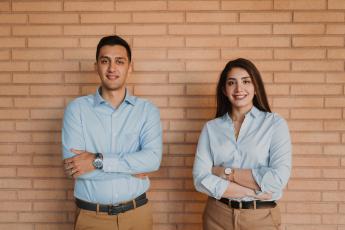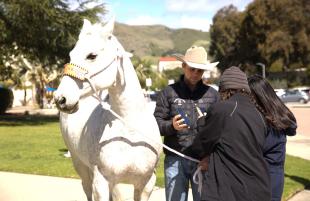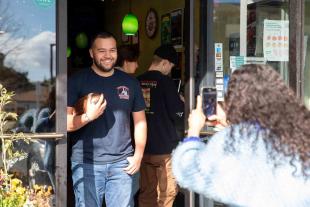International Alumni Work to Give Others a Home — While Creating Their Own

When Amirsalar Pardakhti and Nooshin Shafiee moved to California from Iran, they noticed that the lack of affordable housing in the state had reached crisis levels. And once the COVID-19 pandemic hit, new low-income housing developments seem unlikely in the face of budget deficits.
Pardakhti and Shafiee, recent graduates of Cal Poly’s Master in Architecture program, saw an opportunity to help, one home at a time. They understood many homeowners and developers could add guesthouses by building an accessory dwelling unit (ADU) on their property — a process that was made easier when California eased zoning restrictions on these freestanding flats in 2019.
The duo came up with an idea for a business that could streamline the construction process and create more units in existing neighborhoods while major housing projects are on hold.
Pardakhti and Shafiee are now launching the startup CADU, a digital platform that centralizes all of the steps in building ADUs or other architectural projects, from initial design to furnishing. With nearly two thirds of California’s residences zoned as single-family homes, they see a large potential market for ADUs.
The venture is one of eight teams in the Center for Innovation and Entrepreneurship’s (CIE) Summer Accelerator. The program, which is usually based out of CIE’s HotHouse in downtown San Luis Obispo, has pivoted in the face of the pandemic to become completely virtual while empowering student, alumni and community entrepreneurs.
At Cal Poly and within the accelerator cohort, Shafiee and Pardakhti have built a new home. The newly-married couple immigrated to California from Iran after earning bachelor’s degrees from the University of Tehran.
“We wanted to have the opportunity to grow and follow our dreams, so that’s why we chose to move and come here,” Shafiee said. “I’m really happy with the decision we made. All of the professors, and even students, were supportive in whatever we wanted to do.”
One Cal Poly professor in particular, Amir Hajrasouliha, became a close ally. When he heard about their business idea, the city and regional planning professor and fellow University of Tehran alumnus urged them to join the CIE’s summer accelerator cohort. The program could help them build business skills needed to complement their architectural expertise and get their idea off the ground.
While finishing up their final months in the master’s program, Shafiee and Pardakhti applied to the accelerator and decided to give the entrepreneurial route a try after graduation.
“Nooshin and Amirsalar make an incredible team and presented a compelling case for leveraging the value of the accelerator program,” said Jose Huitron, CIE’s director of student innovation programs. “With their educational background, curiosity and coachability, they will go far and tap into a unique opportunity to disrupt the housing industry.”
The team is working through an intensive 12-week crash course in the accelerator, which provides $10,000 in seed funding plus educational workshops, personalized coaching, virtual networking and mentorship from seasoned entrepreneurs.
Shafiee and Pardakhti work alongside startups developing tactical robotics for emergency responders, leveraging technology to connect health professionals, increasing productivity in coworking spaces, and providing access to healthy snacks on the go.
Along the way, the vision for CADU has taken several turns while adapting to the needs of their customers and the quickly evolving pandemic economy.
Pardkhti says he isn’t afraid of starting a business in the midst of economic uncertainty.
“We are thinking about really huge brands in the architecture field that started their business in 2008 or 2009 in a recession, so we are really hopeful about going to market,” he said.
However, along with professional opportunities, the pandemic also presents personal challenges for the entrepreneurs.
“With the pandemic, it’s a bit risky if either of us want to go back [to Iran] because it’s a chance that we wouldn't be able to come back to the United States,” Shafiee said. “We are sad about the fact that we cannot see our family for who knows how long, but this all has excitement as well as challenges and that’s okay.”
Now Pardakhit and Shafiee are gearing up for their ultimate pitch to investors and community members at CIE’s virtual Demo Day on Sept. 18. The event represents not only a culmination of the CIE’s Accelerator program, but a celebration of the years of hard work that brought the couple 6,000 miles from home to seize new opportunities.
“We have had a very long journey… We took the challenge to immigrate to the United States, which I got to say was very difficult,” Shafiee said. “Now we are married, we are starting a business, and we have a good feeling about this all.”
CIE’s virtual Demo Day is open to all. Register at http://bit.ly/2020DemoDay.



